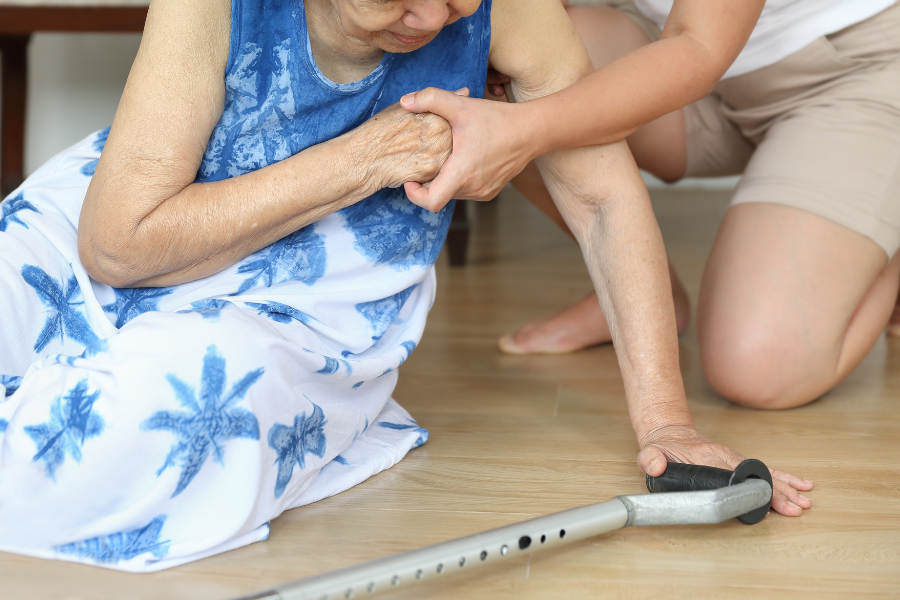
Learn how to keep your elderly loved ones safe and prevent falls with these simple and effective tips.
Understanding the Risks of Falls in the Elderly
As people age, the risk of falls becomes more prevalent. Seniors are more susceptible to falls due to factors such as decreased balance, muscle weakness, and vision problems. Falls can lead to serious injuries, such as fractures, head trauma, and even hospitalizations. It is important to understand the risks associated with falls in the elderly to effectively prevent them.
Some common risk factors for falls in the elderly include:
– Muscle weakness and loss of balance
– Chronic health conditions like arthritis and Parkinson’s disease
– Medications that can cause dizziness or lightheadedness
– Poor vision or hearing impairments
– Hazards in the home environment, such as clutter or slippery floors
By identifying and addressing these risk factors, you can significantly reduce the chances of falls in your aging parent.
Creating a Safe Environment at Home
One of the most effective ways to prevent falls in the elderly is by creating a safe environment at home. Here are some tips to make your parent’s home fall-proof:
– Remove tripping hazards such as loose rugs, clutter, and electrical cords.
– Install grab bars in the bathroom and near the toilet and shower for added stability.
– Improve lighting in hallways, staircases, and frequently used areas to enhance visibility.
– Secure carpets and rugs with non-slip backing or double-sided tape.
– Keep commonly used items within reach to prevent overreaching or bending down.
Taking these simple measures can significantly reduce the risk of falls and ensure a safe living environment for your aging parent.
Promoting Strength and Balance Through Exercise
Regular exercise plays a crucial role in maintaining strength, balance, and coordination, which are essential for preventing falls in the elderly. Encourage your aging parent to engage in exercises that focus on:
– Strength training: This includes activities like lifting weights, using resistance bands, or performing bodyweight exercises to strengthen the muscles.
– Balance exercises: Yoga, tai chi, and simple balance exercises like standing on one leg can help improve stability and prevent falls.
– Flexibility exercises: Stretching exercises can enhance the range of motion and reduce the risk of muscle stiffness and imbalance.
Ensure that your parent consults their healthcare provider before starting any exercise program to determine the most suitable exercises based on their health condition. Regular physical activity can significantly reduce the risk of falls and improve overall well-being.
Ensuring Proper Medication Management
Medication management is crucial in fall prevention for the elderly. Some medications can cause side effects like dizziness, drowsiness, or blurred vision, increasing the risk of falls. To ensure proper medication management:
– Keep an updated list of all medications your parent is taking, including prescription drugs, over-the-counter medications, and supplements.
– Review the medications with their healthcare provider to identify any that may increase fall risk or interact with other medications.
– Follow the prescribed dosage instructions and schedule.
– Be aware of any potential side effects and report them to the healthcare provider.
By properly managing medications, you can minimize the risk of falls associated with medication-related side effects.
Seeking Professional Help and Support
In addition to taking preventive measures at home, seeking professional help and support can further enhance fall prevention for the elderly. Consider the following:
– Schedule regular check-ups with their healthcare provider to assess their overall health, medication management, and any specific fall risks.
– Consult with a physical therapist who can create a personalized exercise program to improve strength, balance, and mobility.
– Consider assistive devices such as canes or walkers, if necessary, to provide additional support and stability.
– Explore community resources and support groups that can provide valuable information and assistance in fall prevention.
By collaborating with healthcare professionals and utilizing available resources, you can ensure comprehensive care and support for your aging parent in preventing falls.
Conclusion
In conclusion, preventing falls in the elderly requires a multi-faceted approach that includes understanding the risks, creating a safe home environment, promoting strength and balance through exercise, ensuring proper medication management, and seeking professional help and support. By implementing these simple yet effective tips, you can significantly reduce the likelihood of falls and create a safe living environment for your aging loved ones. Remember, taking proactive measures and collaborating with healthcare professionals are key in ensuring the safety and well-being of your elderly family members. Stay informed, stay proactive, and together, we can help our loved ones age gracefully and safely.Learn how to keep your elderly loved ones safe and prevent falls with these simple and effective tips.